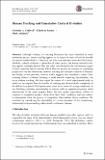Files in this item
Human teaching and cumulative cultural evolution
Item metadata
| dc.contributor.author | Caldwell, Christine A. | |
| dc.contributor.author | Renner, Elizabeth | |
| dc.contributor.author | Atkinson, Mark | |
| dc.date.accessioned | 2020-11-02T10:30:01Z | |
| dc.date.available | 2020-11-02T10:30:01Z | |
| dc.date.issued | 2018-12-01 | |
| dc.identifier | 270928667 | |
| dc.identifier | 755fcb16-33d4-4ad9-a461-9115a03f24e5 | |
| dc.identifier | 85051560367 | |
| dc.identifier.citation | Caldwell , C A , Renner , E & Atkinson , M 2018 , ' Human teaching and cumulative cultural evolution ' , Review of Philosophy and Psychology , vol. 9 , no. 4 , pp. 751-770 . https://doi.org/10.1007/s13164-017-0346-3 | en |
| dc.identifier.issn | 1878-5158 | |
| dc.identifier.uri | https://hdl.handle.net/10023/20872 | |
| dc.description | This project has received funding from the European Research Council (ERC) under the European Union’s Horizon 2020 research and innovation programme under grant agreement No. 648841 RATCHETCOG ERC-2014-CoG. | en |
| dc.description.abstract | Although evidence of teaching behaviour has been identified in some nonhuman species, human teaching appears to be unique in terms of both the breadth of contexts within which it is observed, and in its responsiveness to needs of the learner. Similarly, cultural evolution is observable in other species, but human cultural evolution appears strikingly distinct. This has led to speculation that the evolutionary origins of these capacities may be causally linked. Here we provide an overview of contrasting perspectives on the relationship between teaching and cultural evolution in humans, and briefly review previous research which suggests that cumulative culture (here meaning cultural evolution featuring a trend towards improving functionality) can occur without teaching. We then report the results of a novel experimental study in which we investigated how the benefits of teaching may depend on the complexity of the skill to be acquired. Participants were asked to tie knots of varying complexity. In our Teaching condition, opportunities to interact with an experienced partner aided transmission of the most complex knots, but not simpler equivalents, relative to exposure to completed products alone (End State Only condition), and also relative to information about the process of completion (Intermediate States condition). We conclude by considering the plausibility of various accounts of the evolutionary relationship between teaching and cultural evolution in humans. | |
| dc.format.extent | 20 | |
| dc.format.extent | 773065 | |
| dc.language.iso | eng | |
| dc.relation.ispartof | Review of Philosophy and Psychology | en |
| dc.subject | BF Psychology | en |
| dc.subject | Experimental and Cognitive Psychology | en |
| dc.subject | Philosophy | en |
| dc.subject | 3rd-DAS | en |
| dc.subject.lcc | BF | en |
| dc.title | Human teaching and cumulative cultural evolution | en |
| dc.type | Journal article | en |
| dc.contributor.institution | University of St Andrews. School of Psychology and Neuroscience | en |
| dc.contributor.institution | University of St Andrews. School of Management | en |
| dc.identifier.doi | 10.1007/s13164-017-0346-3 | |
| dc.description.status | Peer reviewed | en |
This item appears in the following Collection(s)
Items in the St Andrews Research Repository are protected by copyright, with all rights reserved, unless otherwise indicated.

